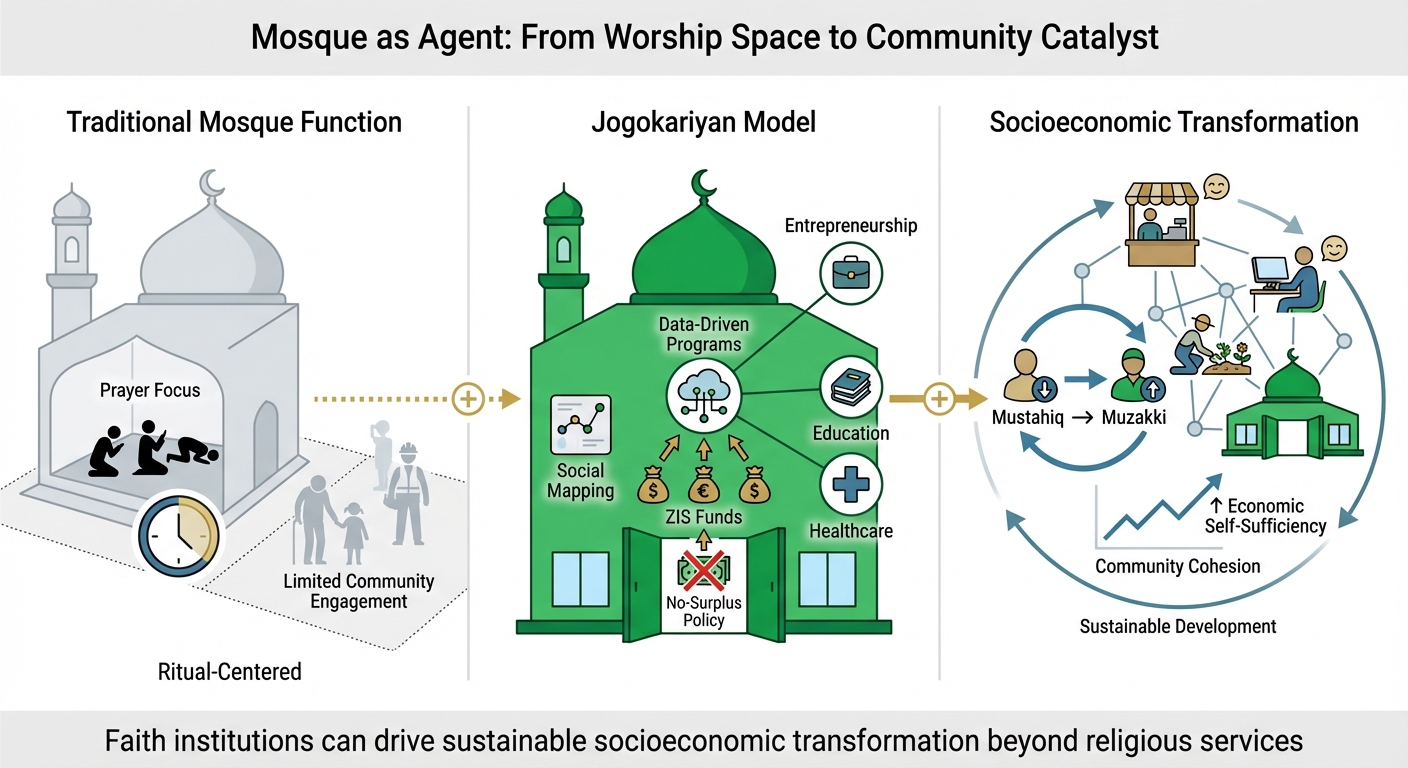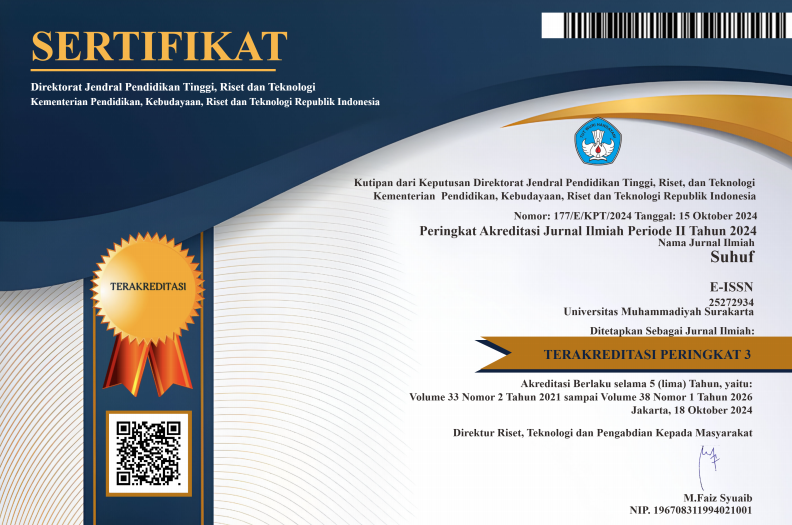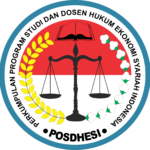The Mosque as an Agent of Social Welfare: Philanthopic Programs at Jogokariyan Mosque
DOI:
https://doi.org/10.23917/suhuf.v37i2.10798Keywords:
Masjid Jogokariyan, Community-based, Empowerment, Islamic philanthropy, Social welfare, Mosque managementAbstract
This article explores the role of Jogokariyan Mosque as an agent of social transformation in enhancing community welfare through Islamic philanthropic programs and community-based economic empowerment. Departing from the conventional function of mosques limited to ritual worship, Jogokariyan Mosque has evolved into a center of socio-economic integration that actively engages in uplifting the local community. Using a qualitative-descriptive method, this study examines the mosque’s strategic approaches, programmatic innovations, and the socio-economic impacts of its philanthropic activities. Findings reveal that Jogokariyan Mosque implements a comprehensive, data-driven social mapping system to design needs-based programs. It adopts a no-surplus financial policy, ensuring that zakat, infaq, and sadaqah (ZIS) funds are immediately allocated for entrepreneurship, education, and healthcare. Through these initiatives, the mosque facilitates the transformation of beneficiaries (mustahiq) into donors (muzakki) and strengthens social cohesion rooted in Islamic ethical values. The study highlights the potential of faith-based institutions to function as sustainable community empowerment centers. Further research is recommended to assess the scalability and long-term impact of such mosque-based models across diverse socio-cultural contexts.
Downloads
References
[1] L. Letmiros, “Jogokariyan Mosque In Yogyakarta : As A Legendary International Review of Humanities Studies,” Int. Rev. Humanit. Stud., vol. 5, no. 2, pp. 511–523, 2020, [Online]. Available: https://scholarhub.ui.ac.id/irhs/vol5/iss2/3/
[2] M. Jogokariyan, “Profil Masjid Jogokariyan Yogyakarta,” Masjid Jogokariyan. Accessed: May 25, 2025. [Online]. Available: https://masjidjogokariyan.com/
[3] A. Widianto and R. Lutfiana, “Meneguhkan Spirit Kemaslahatan: Masjid, Pemberdayaan dan Transformasi Sosial [[Affirming the Spirit of Public Welfare: The Mosque, Empowerment, and Social Transformation],” Asketik, vol. 5, no. 1, pp. 1–13, (Indonesia), Jul. 2021, doi: https://doi.org/10.30762/ask.v5i1.2872.
[4] R. Winarsih, A. R. Masrifah, and K. Umam, “The Integration Of Islamic Commercial And Social Economy Through Productive Waqf To Promote Pesantren Welfare,” J. Islam. Monet. Econ. Financ., vol. 5, no. 2, pp. 321–340, Jul. 2019, doi: https://doi.org/10.21098/jimf.v5i2.1065.
[5] A. Pellu, “Manajemen pemberdayaan ekonomi masyarakat berbasis masjid: studi kasus pada masjid Jogokariyan Yogyakarta [Mosque-Based Community Economic Empowerment Management: Case Study of Jogokariyan Mosque, Yogyakarta],” UIN Sunan Ampel Surabaya, 2020. [Online]. Available: http://digilib.uinsa.ac.id/41573/
[6] A. Arsam, S. Nurmahyati, and A. Amaluddin, “Manajemen Dakwah Takmir Masjid Jogokaryan dalam Membangun Peradaban Islam di Mantrijeron Yogyakarta [Da’wah Management by the Jogokaryan Mosque Takmir in Developing Islamic Civilization in Mantrijeron, Yogyakarta],” Tadbir J. Manaj. Dakwah, vol. 9, no. 1, pp. 19–40, (Indonesia), May 2024, doi: https://doi.org/10.15575/tadbir.v9i1.33885.
[7] M. Fauzi and A. Gunawan, “Filantropi Global Membentuk Negara Kesejahteraan: Perspektif Islam dan Yahudi [Global Philanthropy Shaping the Welfare State: Islamic and Jewish Perspectives],” JSSH (Jurnal Sains Sos. dan Humaniora), vol. 6, no. 2, pp. 141, (Indonesia), Oct. 2022, doi: https://doi.org/10.30595/jssh.v6i2.13608.
[8] M. Hizbullah, Y. Yeltriana, H. Haidir, and A. Saragih, “Peran Dewan Kemakmuran Masjid dalam Membangun Solidaritas Umat [The Role of the Mosque Welfare Council in Fostering Solidarity Among the Ummah],” Titian J. Ilmu Hum., vol. 6, no. 2, pp. 255–263, (Indonesia), Dec. 2022, doi: https://doi.org/10.22437/titian.v6i2.21885.
[9] D. Fauzi and M. Muhyani, “Dakwah Berbasis Masjid: Studi Kasus Masjid Jogokariyan Yogyakarta [Da’wah Centered on the Mosque: A Case Study of Jogokariyan Mosque, Yogyakarta],” Komunika J. Commun. Sci. Islam. Dakwah, vol. 3, no. 2, pp. 163, (Indonesia), Dec. 2019, doi: https://doi.org/10.32832/komunika.v3i2.4988.
[10] S. Yudho Anggoro, “the Analysis of Infaq Fund Administration Masjid Jogokariyan Mantrijeron Yogyakarta in Islamic Perspective,” J. Ekon. dan Bisnis Islam (Journal Islam. Econ. Business), vol. 4, no. 1, p. 78, 2018, doi: https://doi.org/10.20473/jebis.v4i1.10075.
[11] A. Febriani, N. S. Zuhri, M. A. S. Lutfi, and A. E. Sujianto, “Relevansi Filantropi Islam Dalam Meningkatkan Kesejahteraan Masyarakat (Studi kasus : masyarakat disekitar Masjid Al Munawar Tulungagung) [The Role of Islamic Philanthropy in Enhancing Community Welfare: A Case Study of the Al Munawar Mosque Community in ,” Madani J. Polit. dan Sos. Kemasyarakatan, vol. 14, no. 03, pp. 522–540, (Indonesia), Dec. 2022, doi: https://doi.org/10.52166/madani.v14i03.3735.
[12] I. Mustofa, “Nalar Filosofis Sustainable Development Goals (SDGS) dalam Tata Kelola Filantropi Islam Berbasis Masjid di Surabaya [Philosophical Foundations of the Sustainable Development Goals (SDGs) in the Management of Mosque-Based Islamic Philanthropy in Surabaya],” Maliyah J. Huk. Bisnis Islam, vol. 11, no. 1, pp. 129–156, (Indonesia), Jun. 2021, doi: https://doi.org/10.15642/maliyah.2021.11.1.129-156.
[13] Siti Khusnia and Imam Royani Hamzah, “Analisis Kontribusi Filantropi Islam Terhadap Kesejahteraan Mustahik Di Tengah Pandemi Covid-19 Perspektif Maqashid Syariah (Study Kasus BAZNAS Kota Kediri) [Analyzing the Contribution of Islamic Philanthropy to Mustahik Welfare Amid the COVID-19 Pandemic,” ADL Islam. Econ. J. Kaji. Ekon. Islam, vol. 3, no. 1, pp. 27–42, (Indonesia), Jul. 2022, doi: https://doi.org/10.56644/adl.v3i1.37.
[14] A. Risky, Suyadi, and A. M. Husain, “The Role of the Mosque in Educating Harmonious Families (A Study at Jogokariyan Mosque, Mantrijeron),” J. Proc. Ser. 2nd Int. Conf. Islam. Educ., vol. 2, no. 1, pp. 9–21, 2024, [Online]. Available: https://jurnal.iimsurakarta.ac.id/index.php/icie/article/view/490/334
[15] P. H. I. Jaya, “Trickle Down Efeck dan Perubahan Wajah Masjid di Yogyakarta [The Impact of the Trickle-Down Effect on the Transformation of Mosques in Yogyakarta],” INFERENSI, J. Penelit. Sos. Keagamaan, vol. 12, no. 1, pp. 1–24, (Indonesia), 2018, doi: http://dx.doi.org/10.18326/infsl3v12i1.1-24.
[16] A. Arrozy, M. Wijaya, and D. T. Kartono, “Capital and Capacity in Reproduction of The Community of Masjid Kampung Jogokariyan Yogyakarta,” J. Soc. Polit. Sci., vol. 2, no. 3, pp. 767–776, 2019, [Online]. Available: https://papers.ssrn.com/sol3/papers.cfm?abstract_id=3454073
[17] A. Danis, D. S. Rozza, and R. Romlah, “Mosque Based Community Empowerment (Case Study: Jogokariyan Mosque),” At-Ta’dib, vol. 17, no. 1, pp. 160–179, Jun. 2022, doi: http://dx.doi.org/10.21111/at-tadib.v17i1.7894.
[18] F. Hidayat, “COMMUNITY DEVELOPMENT BERBASIS FILANTROPI (Studi di Masjid Jogokariyan Tahun 2020-2022) [Community Development Based on Philanthropy: A Case Study of Jogokariyan Mosque, 2020–2022],” UIN Sunan Kalijaga Yogyakarta, 2022. [Online]. Available: https://digilib.uin-suka.ac.id/id/eprint/54981/
[19] A. Nurfatmawati, “Strategi Komunikasi Takmir dalam Memakmurkan Masjid Jogokariyan Yogyakarta (Communication Strategy of the Mosque Management for Prosperity of Jogokariyan Mosque Yogyakarta),” J. Dakwah Risal., vol. 31, no. 1, pp. 21, (Indonesia), Jun. 2020, doi: https://doi.org/10.24014/jdr.v31i1.9838.
[20] M. N. Maarif, S. Munir, H. Towpek, and I. Zulqarnain, “Optimization of Welfare State Policy for the Development of Halal Industry in the Framework of Sharia Economy,” Suhuf, vol. 37, no. 1, pp. 1–15, May 2025, doi: https://www.doi.org/10.23917/suhuf.v37i1.9195.
[21] A. Maisyarah and M. Z. Hamzah, “Zakat Distribution Management: A Systematic Literature Review,” Suhuf, vol. 36, no. 1, pp. 95–108, May 2024, doi: https://www.doi.org/10.23917/suhuf.v36i1.4357.
[22] A. Alam, R. S. Nizam, and M. T. Hidayat, “The Role of Islamic Microfinance Institution in Empowering Indonesian Fishing Communities,” Univers. J. Account. Financ., vol. 9, no. 2, pp. 178–183, 2021, doi: https://doi.org/10.13189/ujaf.2021.090205.
[23] M. ARWANI, “Strategi Dakwah Takmir Masjid Jogokariyan Yogyakarta Dalam Meningkatkan Shalat Subuh Berjamaah [Strategies of the Takmir Management at Jogokariyan Mosque, Yogyakarta, to Promote Congregational Fajr Prayer],” Institut Agama Islam Negeri Surakarta, 2017. [Online]. Available: https://fud2.uinsaid.ac.id/akasia/index.php?p=show_detail&id=1213&keywords=
[24] K. Hudiwasono, R. F. Rahmi, C. Ningrum, and T. Hidayat, “The Mosque as a Source of Community Prosperity : Lessons from the Jogokariyan Mosque,” JIEP J. Islam. Econ. Philanthr., vol. 7, no. 1, pp. 13–27, 2024, doi: https://doi.org/10.21111/jiep.v7i1.12328.
[25] A. M. Furkon, “Zakat sebagai Instrumen Welfare State Dalam Islam [Zakat as a Mechanism of the Islamic Welfare State],” J. Syntax Imp. J. Ilmu Sos. dan Pendidik., vol. 4, no. 6 SE-Articles, pp. 752–767, (Indonesia), Dec. 2023, doi: https://doi.org/10.36418/syntax-imperatif.v4i6.312.
[26] A. Alam, D. Sari, and L. Hakim, “The Impact of Productive Zakat Program on the Economy of Zakat Recipients: Study in Baznas Surakarta,” J. Islam. Econ. Financ. Stud., vol. 3, no. 2, p. 88, Dec. 2022, doi: https://doi.org/10.47700/jiefes.v3i2.4774.
[27] F. Sabili, D. Romansyah, and R. Hidayat, “Akuntabilitas Dan Transparansi Laporan Keuangan Masjid (Studi Kasus Masjid Jogokariyan Yogyakarta)[Accountability and Transparency in Financial Reporting of Mosques: A Case Study of Jogokariyan Mosque, Yogyakarta],” J. Akunt. dan Keuang. Islam, vol. 11, no. 2, pp. 233–249, (Indonesia), Oct. 2023, doi: https://doi.org/10.35836/jakis.v11i2.626.
[28] A. Alam, R. Tri Ratnasari, B. Habibi, and F. Hanif Noor Athief, “A sharia economic collaboration model and its positive impact on developing of poor villages: A study in Indonesia,” Public Munic. Financ., vol. 11, no. 1, pp. 101–112, Oct. 2022, doi: https://doi.org/10.21511/pmf.11(1).2022.09.
[29] F. H. N. Athief, L. I. Cahyaningrum, D. Rizki, and A. El Ashfahany, “The Synergy of BWM and BUMDES as an Alternative for Improving the Welfare of SME,” J. Masharif Al-Syariah J. Ekon. dan Perbank. Syariah, vol. 8, no. 3, pp. 672–683, Nov. 2023, doi: https://doi.org/10.30651/jms.v8i3.20656.
[30] L. A. Zayl et al., “ZISWAF Management Strategy in Creating Community Welfare at Jogokariyan Mosque,” CASHFLOW Curr. Adv. Res. SHARIA Financ. Econ. Worldw., vol. 4, no. 2, pp. 168–186, Jul. 2025, doi: https://doi.org/10.55047/cashflow.v4i2.1875.

Downloads
Submitted
Accepted
Published
How to Cite
Issue
Section
License
Copyright (c) 2025 Neneng Nadila Kurniawati, Afief El Ashfahany, Mohammad Zahid Khan

This work is licensed under a Creative Commons Attribution 4.0 International License.


















